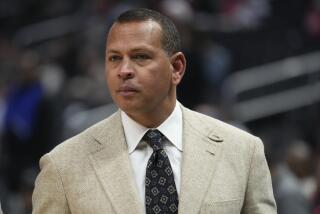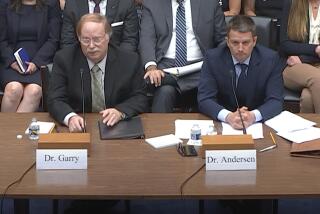THE O.J. SIMPSON MURDER TRIAL : Defense Hopes FBI Agent Can Blunt Expert’s Testimony : Trial: Chemist has accused colleague of misconduct in previous cases. Lawyers say he could cast doubt on the credibility of Roger Martz, who testified about preservatives on Simpson’s socks.
- Share via
The defense’s mystery witness in the O.J. Simpson double murder trial is a 47-year-old FBI chemist who has accused a fellow FBI agent who analyzed evidence in the Simpson case of misconduct in previous cases, including the World Trade Center bombing.
Although it is far from certain that Simpson jurors will ever hear from FBI Agent Frederic J. Whitehurst, Simpson’s defense team hopes to use him to cast doubt on the credibility of FBI toxicologist Roger Martz and the lab where he works.
Martz testified in July about the defense’s contention that blood on a sock found in Simpson’s bedroom and on a gate at the scene of the double murder was laced with a preservative used by authorities on blood samples--part of a defense allegation that police framed Simpson.
The defense team has contended that the blood was planted and said the presence of EDTA proved it.
Martz, however, said that his tests did not necessarily indicate the presence of EDTA.
Although Martz’s testimony ended up favoring the prosecution, he was a defense witness--called by Simpson’s lawyers as a condition of presenting their own expert on the subject.
Whitehurst, the mystery witness Simpson’s team now wants to call, does not allege that Martz did anything wrong in the Simpson case.
But Whitehurst has alleged that Martz produced questionable test results in a high-profile 1991 bombing case in which a federal judge was killed, as well as in the World Trade Center investigation.
In addition, Whitehurst has complained to Justice Department officials that his FBI superiors pressured him to change his testimony in order to aid the prosecution in the first World Trade Center bombing trial, which resulted in four convictions.
“There was a great deal of pressure put on me to bias my interpretation” of test results in a manner that would aid prosecutors, Whitehurst told a federal jury hearing the second case to grow out of the bombings, which has not yet concluded. Whitehurst said his superiors told him “not to provide alternative theories that could be used by the defense” in the World Trade Center case. “I was not to give the defense anything that could be used.”
He specifically charged that reports done by Martz about the presence of urea nitrate in the bombing case were false.
Whitehurst, an explosives expert who has a Ph.D from Duke University and is a Vietnam veteran, is involved in a legal battle with the FBI over his demotion to the bureau’s paint analysis unit, following his criticisms of colleagues.
Last night, the FBI issued a two-paragraph statement saying that over the past several years, Whitehurst “has raised a variety of concerns about forensic protocols and procedures employed in the FBI Laboratory” in Washington, D.C.
“In all instances, the FBI, or the Department of Justice inspector general’s office, or, in some cases both, have vigorously investigated his concerns and are continuing to do so. The FBI alone has reviewed more than 250 cases involving work previously done by the laboratory. To date, the FBI has found no evidence tampering, evidence fabrication or failure to report exculpatory evidence.”
The statement added that “any finding of such misconduct will result in tough and swift action by the FBI” and said the agency was “fully cooperating with the inspector general’s ongoing investigations of Whitehurst’s allegations.” The statement did not specifically refer to Martz, who could not be reached for comment.
Nevertheless, earlier in the day Simpson’s lead lawyer, Johnnie L. Cochran Jr., said Whitehurst could be key to the Simpson case. “Frederic Whitehurst . . . will testify about practices in the FBI lab which we think are totally relevant to this case,” Cochran said. “They relate to Agent Martz and an investigation he’s under for falsifying . . . evidence to slant to the bias of the prosecution in high-profile cases. Whitehurst knows everything. It’s an investigation that’s been going on for months and you’ll be hearing a lot more about it.”
Federal law enforcement sources said yesterday that Whitehurst, who has been subpoenaed, will be allowed to testify in the Simpson case if Superior Court Judge Lance A. Ito determines that he has relevant evidence to offer.
The defense faces a stiff challenge getting Whitehurst in front of the Simpson jury. “To have admissible testimony, Whitehurst would have to have information either specific to the O.J. Simpson case or information which strongly could be inferred to relate to the Simpson case,” said Gerald L. Chaleff, a prominent defense lawyer. “The mere fact that Whitehurst has accused a prosecution witness of lying or falsifying reports in the past in unrelated cases does not in and of itself make his testimony admissible.”
A defense source acknowledged that Simpson’s lawyers do not have any evidence of misconduct by Martz in this case, but said that they hope to show a pattern of misconduct by Martz, based on the New York case, his work in an Alabama bombing case and perhaps others.
In 1991, according to an internal FBI memo obtained by The Times, Whitehurst accused Martz and another FBI agent of fabricating evidence in the trial of Walter Leroy Moody, who was convicted of killing a federal appeals court judge and a civil rights lawyer with letter bombs and ultimately was given a life sentence with no possibility of parole. Current FBI Director Louis J. Freeh was the prosecutor in that case.
According to the memo, Whitehurst alleged that Martz “circumvented established procedures and protocols of the FBI laboratory’s scientific analysis section, misled the trier of fact to believe that he had a recognized expertise in the area of explosives residue analysis, performed the analyses incorrectly and misled the trier of fact concerning the significance and weight of the evidence that he was improperly entrusted with analyzing.”
However, the lawyer for the convicted bomber said Martz’s testimony had no significant impact on the case.
“I can’t comment on what happened in the FBI laboratory,” Edward Tolley said. “But if Martz phonied up evidence it doesn’t make sense. His testimony was not that important. Moody was convicted principally on the testimony of his wife, a matching fingerprint that was very difficult, if not impossible, to explain, the testimony of his best friend that he helped Moody build the bombs, other direct evidence and Moody’s own testimony, much of it corroborative of the government evidence and some of it bordered on an admission.”
Whitehurst’s attorney, Stephen Kohn, did not return calls seeking comment.
In the Simpson case, defense lawyers are hoping to persuade Judge Ito that Whitehurst’s allegations about Martz show that the toxicologist engaged in biased science and reporting designed to favor prosecutors. “The relevance of this pattern of habit and custom to our defense in this case is clear,” a defense source said.
Prosecutors in the Simpson case said they have not been given any transcripts or memos on Whitehurst’s allegations. They are expected to contend that Whitehurst has nothing meaningful to offer in the Simpson case. If he is called, they may attempt to erode his credibility by focusing on his clashes with colleagues.
In the New York case, Whitehurst testified that he was criticized openly at the FBI and told that “the prosecution was going to circumvent my testimony by having another expert testify.”
The relationship between Martz and Whitehurst was so strained that Whitehurst took the unusual step of conducting a scientific sting operation against his colleague.
Whitehurst, suspicious when his own test results differed from Martz’s, testified that he surreptitiously submitted two samples--including one containing residue of his own urine--to the FBI’s Washington laboratory.
Whitehurst knew there was no urea nitrate in his samples, he testified; when Martz said his test results detected large quantities of the substance, Whitehurst said he believed he had uncovered a serious problem.
Times staff writers Ronald J. Ostrow in Washington and Robert Jackson in New York contributed to this story.
More to Read
Sign up for Essential California
The most important California stories and recommendations in your inbox every morning.
You may occasionally receive promotional content from the Los Angeles Times.













